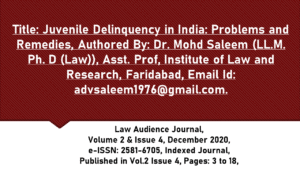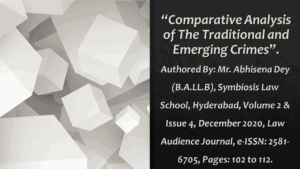Click here to download the full paper (PDF)
Authored By: Ms. Kanniga T (B.A.LL.B), Government Law College, Chengalpattu.
Click here for Copyright Policy.
Click here for Disclaimer.
I.INTRODUCTION:
The Constitution is the supreme law of the land, it is the vehicle of a Nation’s progress. A Constitution means a document having a special legal sanctity which sets out the frame-work and the principal functions of the organs of the Government of a State and declares the principles governing the operation of those organs.[1] The Constitution of India was framed by a Constituent Assembly setup under the Cabinet Mission plan, 1946 and enforced in January 26, 1950. The Constitution of India consists of 470 Article, 25 Parts and 12 Scheduled at present, part 2 of the Constitution of India explains about Citizenship. Article 5 to 11 describes about Citizenship; the provisions are rightly pointed out that who are citizens of India? The Citizenship Act of 1955 was amended six times, 1986, 1992, 2003, 2005, 2015 and 2019 related to the issue of Citizenship in India.
II. MEANING OF CITIZENSHIP:
The population of State is divided into two classes, Citizens and Aliens. The word ‘Citizen’ is derived from the Latin term ‘Civis’. It means resident of a City State, the Constitution of India provides for single and uniform Citizenship for the whole of India. A citizen of a state is a person who enjoys full civil and political rights. Citizens are different from aliens who do not enjoy all these rights. Citizenship carries with it certain advantages conferred by the Constitution. Aliens do not enjoy these advantages.
The following fundamental rights are available only to citizens:
- The right not to be discriminated against any citizen on grounds of religion, race, caste, sex or place of birth (Article 15).
- The right to equality of opportunity in the matter of public employment (Article 16).
- The right to Six freedoms enumerated in Article 19, i.e., freedom of speech and expression; assembly; association; movement; residence; profession.
- Cultural and educational rights conferred by Article 29 and 30.
- There are certain offices under the Constitution which can be occupied by citizens only e.g., office of the President [Article 58 (1)(a)]; Vice-President [Article 66 (3)(a)]; Judges of the Supreme Court [Article 124(3)]; Judges of the Supreme Court [Article 124 (3)] or of a High Court [Article 217 (2)]; Attorney-General [Article 76(1)]; Governor of a State [Article 157]; Advocate-General of a State [Article 76 (1)]; Governor of a state [Article 165].
- The Right to vote for election to the House of the people and the Legislative Assemblies of States is available to the citizens only and only they can become members of the Union and the States Legislatures.
The rights guaranteed by Articles 14 and 21 are available to aliens also.[2]
III. CONSTITUTIONAL PROVISIONS FOR CITIZENSHIP:
The Constitution does not lay down a permanent or comprehensive provision relating to citizenship in India. Part 2 of the Constitution simply describes classes of persons who would be deemed to be the citizens of India at the enforcement of the Constitution, January 26, 1950. Article 11 expressly confers power on Parliament to make laws to provide for such matters. In exercise of its power the parliament has enacted the Indian Citizenship Act, 1955. This Act provides for the acquisition and termination of citizenship subsequent to the commencement of the Constitution.[3] Article 5 to 8 of the Constitution of India shall become citizens of India at the enforcement of the Constitution: 1. Citizenship by domicile (Article 5). 2. Citizenship of emigrants from Pakistan (Article 6). 3. Citizenship of migrants to Pakistan (Article 7). 4. Citizenship of Indians abroad (Article 8).
III.I Citizenship by Domicile (Article 5):
According to Article 5, a person is entitled to citizenship by domicile if he fulfils the following conditions: First condition: At the Commencement of the Constitution, he must, have his domicile in the territory of India. Second condition: At the Commencement of the Constitution, he must be born in the territory of India or either of his parents was born in Indian or at the commencement of the Constitution he must have been ordinarily resident in the territory of India for not less than five years before the commencement. Domicile in India is considered an essential requirement for acquiring the status of Indian Citizenship in the country. But the term ‘domicile’ is not defined in the constitution of India. The domicile of the person in the country in which he either has or deemed by law to have his permanent house, it accomplished that he had an intention to make it his permanent home.
There is a distinction between two main classes of domicile that is Domicile of origin and Domicile of choice. The domicile of origin was acquired by the born in the country and Domicile of choice was acquired residence in territory by the intention of the person to reside there permanently.
In Pradeep Jain v. Union of India[4], the Supreme Court has held that in India Article 5 recognises only one domicile viz. domicile of India. It does not recognise the only the notion of state domicile. The concept of Domicile has relevance to the applicability of municipal laws whether made by the Union of India or by the states. Two elements are necessary for the existence of domicile; (1) a residence of a particular kind, and 2) an intention of a particular kind.
In Mohammad Raza v. State of Bombay[5], the appellant came to India in 1938. He went on pilgrimage to Iraq in 1945. On return, he was registered as a foreigner and several times his stay in India was extended. In 1957 his request to extent the stay period was refused. He contended that he must be regarded as a citizen of India under Article5, but his appeal was dismissed. The Court held that though he was original resident, he did not acquire Indian citizenship because he did not have a domicile in India. When the appellant returned from Iraq, he took over the job of a cashier in a hostel. That by itself was held insufficient to establish that there was a change in his mind of the kind necessary to acquire a new domicile. His application for extending his stay in India made from time to time fortified this conclusion. The domicile of choice continues until the former domicile has been resumed or another has been acquired.
Intention is an important element in determining the domicile of a person. It can be inferred from the conduct of persons. Thus, a person in Government service, who was given the choice for opting for India or Pakistan, who opted of Pakistan, actually went to Pakistan, served there under the Government of Pakistan, but who subsequently resigned his job there and came to India cannot claim the benefit of Article 5 for he never became the citizen of India.[6]
III.II Citizenship of Migrants to India from Pakistan (Art. 6):
Persons who have migrated from Pakistan to India have been classified into two categories for the purpose of citizenship, i.e., 1. Those who came to Indian before July 19, 1948; and 2. Those who came on or after July 19, 1948. And Article 6 provides that a person who has migrated to India from Pakistan shall be deemed to be a citizen of India at the Commencement of the Constitution, i.e., on 26th January, 1950, if he or either of his parents or any of his grandparents were born in India as defined in the Government of India Act, 1935.[7]
III.III Citizenship of Migrants of Pakistan (Article 7):
Under Article 7 a citizen by domicile (Article 5) or by migration (Article 6) ceases to be a citizen if he has migrated to Pakistan after March 1, 1947. The proviso to Article 7 makes an exception, in favour of a person who has returned to India on the basis of permit for resettlement in India. Such a person is entitled to become a citizen of India if he fulfils other conditions necessary for immigrants from Pakistan after July 19, 1948, under Article 6. He can register himself as citizen of India in the same manner as a person migrating from Pakistan after July 19, 1948.[8] Article 7 thus overrides Articles 5 to 6.[9] Article 6 and 7 use the term ‘migrated’, which means came for consideration before the Supreme Court in Kulathi v. State of Kerala.[10] According to the Court the term migrated used in Article 6 and 7 has to be construed with reference to the context and purpose and the prevailing political condition at the time the Constitution was being enacted. So interpreted, the word ‘migrated’ could mean nothing except voluntarily going from India to Pakistan permanently or temporarily. The majority held that word ‘migrate’ was used in a wider sense of moving from one country with the qualification that such movement was not for a short visit or for a special purpose.
In Bhawanrao khan v. Union of India,[11] the Supreme Court has held that those who had voluntarily migrated to Pakistan and become citizens of Pakistan cannot claim the citizenship of India on the ground that they had been living in India for a long time and their names have been included in the voters list. In this case, a lady Bhanwarao Khan had claimed Indian Citizenship on the ground that she had returned to India in 1955 and had been living here since then. The Court held that “a foreign lady cannot claim Indian citizenship merely on the ground of long stay and inclusion of her name in the voters’ list”.
IV. CITIZENSHIP OF PERSONS OF INDIAN ORIGIN RESIDING OUTSIDE INDIA:
Article 8 provides that any person or either of whose parents or any of those grand-parents was born in India as defined in the Government of India Act, 1935, and who is ordinarily residing any country outside India, shall be deemed to be a citizen of India as if he has been registered as a citizen of India by the Diplomatic or Consular representatives of India in the country where he is for the time being residing—on application made by him to such diplomatic or consular representative, whether before or after 26th January, 1950, in the form and manner prescribed by the Government of the Dominion of India or Government of India. Article 8 confers citizenship on Indian nationals residing abroad on their complying with its provisions.[12]
IV.I Persons voluntarily acquiring citizenship of a foreign State not to be citizens:
Article 9 provides that if a person voluntarily acquires the citizenship of any foreign State, he shall not be able to claim citizenship of India under Article 5, 6 and 8. It deals only with voluntary acquisition of citizenship of a foreign State before the Constitution came into force. Cases of voluntary acquisition of a foreign citizenship before the commencement of the Constitution will have to be dealt with the Government of India under the Citizenship Act of 1955.[13]
IV.II Continuance of the rights of Citizenship:
Article 10 provides that every person who is or is deemed to be a citizen of India under any of the foregoing provisions shall continue to be a citizen of India subject, however, to the provisions of any law that may be made by parliament.[14]
IV.III Parliament to regulate the right of citizenship by law:
According to Article 11, nothing in the foregoing provisions i.e., Article 5 to 10 shall derogate from the power of Parliament to make any provision with respect to the acquisition and termination of citizenship and all other matters relating to citizenship.[15]
V. CITIZENSHIP ACT OF 1955:
Parliament as per the power given under Article 11 of the Constitution, has passed the Citizenship Act, 1955, provides for acquisition and loss of citizenship. This Citizenship Act of 1955 has been amended as far eight times. The Commonwealth Citizenship also provided by Citizenship Act of 1955 but this provision was repealed by the Citizenship (Amendment) Act, 2003. The citizenship Act of 1955 prescribes give ways of acquiring citizenship by birth, by descent, by registration, by naturalisation, by incorporation of Territory.
V.I Acquisition of Citizenship:
- Section 3 (Citizenship by birth): All persons who born in India on or after January 26, 1950 are treated as citizens by birth.
- Section 4 (Citizenship by descent): Any person who born outside India on or after January 26, 1950 shall be acquiring a citizenship of India by descent, if his father is a citizen of India at the time of this birth.
- Section 5 (Citizenship by registration): Any person who can acquire citizenship of India by registration with appropriate authority.
- Section 6 (Citizenship by nationalisation): Foreigners to country can acquire Indian citizenship, on application for nationalization to the Government of India but not being an illegal migrant to the Country.
- Section 7 (Citizenship by Incorporation of Territory): In the event of a certain territory being added to the territory of India, that persons being added to the territory of India, the Government of India shall specify that territory who shall be Citizens of India.
- Section 7A (Overseas Citizen of India Card-holder): Under clause (ee) of Section 2 as substituted by the Amendment Act 1 of 2015, “Overseas Citizen of India Card-holder” means a person registered as an Overseas Citizen of India Card-holder by the Central Government under Section 7A.
V.II Termination of Citizenship:
The Citizenship Act of 1955 prescribes three ways of losing citizenship whether acquired under the Act or prior to it under the Constitution, viz, renunciation of Indian Citizenship who is also a citizen or national of another country (section 8), by termination (section 9) it can be terminated if a person acquires the citizenship of some other country and deprivation (section 10) the central government can deprive a naturalized citizen, if it satisfied that the citizenship was acquired by fraud, false representation or concealment of material facts or indulges in trade with enemy countries or if the person has been sentenced of imprisonment for a period of 2 years.
VI. ONE CITIZENSHIP IN INDIA:
The federal form of government is followed in India, but in the time of emergency, Union undertakes the control of state government for people welfare and security. Both the central government and state government are working separately, but has only one citizenship for the citizens of India. Every citizen has the same rights, immunities and privileges of citizenship, no matter in what state he resides. In federal countries like USA and Switzerland, there is a dual citizenship, namely a citizenship of USA and the citizenship of the State where a person is born and permanently resides, and there are distinct rights and obligations flowing from the two kinds of citizenship. In India, a person born or resident in any State can acquire only one citizenship, that is, the citizenship of India.
VII. CONCLUSION:
Citizenship is necessary for every person in the world, without citizenship there is no legal authority to reside but there are million people in the world had no citizenship and became stateless. Under article 15 of the Universal Declaration of Human Rights, everyone has the right to a nationality and a person cannot be deprived of his or her nationality arbitrarily.
In this Global Trends 2017 report, UNHCR estimated that there are ten million stateless people in the world. However, only 3.9 million of these have been formally identified by UNHCR. It is difficult to estimate the number of stateless people because, unlike refugees, stateless persons in most countries are not registered and granted a legal status and documentation.[16] Countries in the world only gives more right to the citizens but not for the non-citizens of the country, so everyone need a Citizenship for their safety and security.
Bibliography:
- Books:
- J.N. Pandey, Constitutional Law of India, Central Law Agency, Allahabad-2, 57th Edn., 2020.
- P. Jain, Indian Constitutional Law, Lexis Nexis, 18th Edn, 2020.
- Websites:
- Refugeecouncil.Org.
- Report:
- Global Trends 2017 Report.
[1] Dr. J. N. Pandey, Constitutional Law of India 1 (57th ed.,2020)
[2] Ibid., p.42.
[3] Ibid
[4] AIR 1984 SC 142: (1984) 3 SCC 654.
[5] AIR 1956 SC 1436.
[6] Aslam Khan v. Fazal Khan, AIR 1959 All. 79.
[7] Dr. J. N. Pandey, Constitutional Law of India 45 (57th ed., 2020).
[8] Ibid
[9] State of Bihar v. Kumar Amar Singh, AIR 1955 SC 282.
[10] AIR 1967 SC 1614.
[11] AIR 2002 SC 1614.
[12] Dr. J. N. Pandey, Constitutional Law of India 46 (57th ed., 2020)
[13] Ibid
[14] Ibid
[15] Ibid
[16] Stateless, https://www.refugeecouncil.org.au/stateless, visited on: 26/11/2020.



